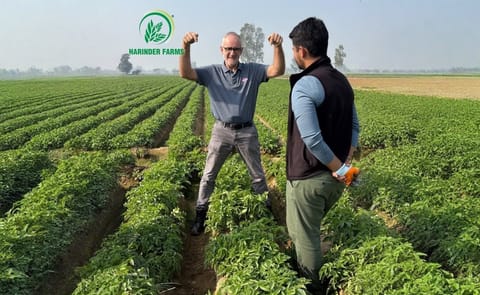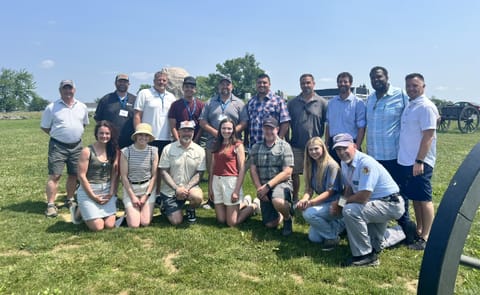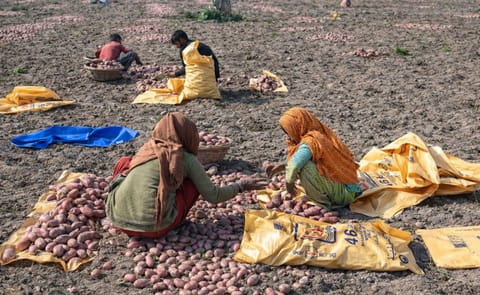Tasmanian-based Agronico shifted focus to 'all things mini tubers and seed potatoes'.
Tasmanian-based Agronico shifted focus to 'all things mini tubers and seed potatoes'

Over three decades, Agronico has shifted its focus from an agriculture consultancy business to all things mini tubers and seed potatoes. The business is always aiming to improve and is currently working on a five-year plan to enhance customer experience, while offering world-class procedures and facilities for seed potato storage, according to a news release by Australian industry body AUSVEG.
Tasmania's fertile soil is ideal for growing healthy vegetables as well as producing potatoes that are high-quality and disease-free. There is plenty of virgin ground available, especially in irrigation areas newly opened by the Tasmanian Government.
Tasmanian-based business Agronico recognizes the Apple Isle's ideal conditions for growing quality potatoes. Over 30 years, it has grown from an agricultural consultancy business – working with individual farmers – into one of Australia’s largest seed potato producers.
Today, it continues to develop the science of seed potato propagation through investment in tissue culture, hydroponics, seed processing, and cool store technology.
Tissue culture
Robert Graham, Agronico Chief Executive Officer:
“In our business, we start with tissue culture.”Keeping everything top-notch is important. Agronico prides itself on world-class seed potato handling procedures, aiming for minimal harvesting and grading damage.
“Research on hydroponic mini tubers started 18 years ago. It took around seven to eight years to perfect it and make it commercially viable.”
“By growing potato mini tubers hydroponically, we get a more uniform tuber size, the system is predictable, and we can fulfill ordered volumes more consistently.”
“Ongoing research and development is vital to Agronico. As a science-driven business, we place an emphasis on solving the problems that farmers encounter.”
“Our team of researchers work primarily in the seed potato industry but also cover broccoli, chemical registrations, and new crops, running trials all-year-round.”
Its intensely-managed field production from G1 maximizes production of G3, making it the final generation of seed potatoes to ware growers. This ensures that the quality is not compromised by pushing to G4 and beyond.

The Agronico cool store in Tasmania
With 18 rooms in total, the cool stores can hold up to 16,000 tonnes and achieve maximum efficiency by being located next to the grading and cutting lines. Trucks can be loaded in the large drive-through corridor in the center of the storage shed, ideal for loading in wet weather.
Robert Graham:
“We can now transport potatoes directly from Tasmanian paddocks for grading and then to the facility for storage in optimum conditions. The cool stores enable varietal control, aid manageable volumes of seed, and this handling process minimizes the aging of seeds leading to good stem count per sett and higher yields.”Mr. Graham said the purpose-built factory improves the viability and quality of seed that is kept in the cool store, and these benefits flow on to Tasmania's potato growers. Best practice procedures are employed when cutting the seed.
“Typically, we store the seed potatoes for up to eight months. The cool stores maintain the perfect temperature to prevent the detrimental impact of carbon dioxide build-up, with the temperature, carbon dioxide, and humidity held at optimum levels and monitored 24/7.”
The quality of operations enables Agronico to cut and cure seed for distribution around Australia without breakdown. For the growers, the freighting cut seed is more efficient than cutting after delivery.
Committed to high-quality seed potatoes
Robert Graham:
“Agronico is committed to improving product and providing opportunities for growers and contractors in Tasmania.”
“We will continue to invest in infrastructure to support and maximize our capabilities as the leading and only vertically integrated supplier of quality seed potatoes in Australia. Additionally, we are the only facility in the world that grows and stores mini tubers and seed potatoes.”
“The wet autumn in 2020 and COVID-19 challenged us, but we harvested over 90 percent of our crop, kept people employed, and diversified our market to include home gardeners.”
“We're very optimistic about the future potential of Tasmanian agriculture.”










